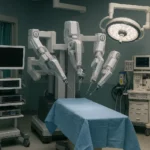Psychedelic Therapy: Ketamine, Psilocybin & MDMA
Depression is more than low mood; it is a constant dullness that dulls joy, purpose, and connection. Furthermore, emerging research highlights psychedelic therapy—ketamine, psilocybin, and MDMA—as powerful tools for healing, offering renewed hope. Once outcasts, however, these substances now show promise in reconnecting individuals with meaning and the divine.
India stands out for its accessible, cost-effective therapies and supportive legal framework, making it an ideal destination for such treatments. Moreover, even short-term prescriptions, like a single dose of Ambien, may complement this holistic approach.
Understanding Psychedelic Therapy: A New Hope for Mental Health
Depression affects more than 280 million people worldwide.
Traditional antidepressants target serotonin receptors, but:
- They often take weeks to work
- Have side effects like weight gain, insomnia or emotional numbness
- Don’t work for treatment-resistant depression
Mood disorders are now among the leading causes of disability worldwide. Therefore, there is an urgent need for alternatives that work faster and deeper. This is where psychedelic therapy enters the conversation.
What is psychedelic medicine?
- Psychedelics are compounds which change consciousness, perception and emotional processing.
- Used for historical spiritual rituals in cultures,
- But took a nosedive in the 1960s due to misappropriated recreational uses, and science is now coming back to reclaim them as legitimate medicines.
Instead of recreational use then, psychedelic therapy is undergone with –
- A controlled setting
- Professional guidance
- Integration sessions after the experience
Therapies usually make use of mindfulness-based treatment to ensure that the patients process their emotions and insights. In addition, this approach helps individuals to achieve deeper emotional understanding and healing.
Ketamine, Psilocybin & MDMA: The Powerhouses of Psychedelic Therapy
Ketamine: The Fastest-Acting Antidepressant
It was originally an anesthetic, and is now considered one of the most efficient drug treatments for depression, particularly in people who show no response to traditional medication.
How it works:
- Acts on the glutamate system of the brain, and not on serotonin
- Stimulates new neural connections (neuroplastic)
- Disrupts negative thought loops that add to depression
- Accesses repressed memory or feeling, in turn, enhancing emotional processing
Benefits:
- Provides relief in hours (not weeks) when hope is often lost- suicidal or severely depressed
- Restructures the brain for greater flexibility
- Boosts mood and motivation through improved communication between regions of the brain
- A potential breakthrough for treatment-resistant depression where other medications have failed
FDA-approved for treating depression through esketamine nasal spray (Spravato) and IV infusions in specialized clinics. As a result, this offers a new treatment option for patients seeking alternative solutions for depression.
Psilocybin: The Healing Power of Magic Mushrooms
“Magic mushrooms” are the source of the active ingredients used in psilocybin therapy.
How it works:
- By affecting serotonin receptors, especially 5-HT2A. It alters brain activity.
- It calms the default mode network (DMN) in the brain.
- Inhibits rigid thought patterns. Resets brain functioning, increases emotional acuity.
Beneficial:
- Self-reflection and emotional release
- Confronting internally suppressed trauma or grief with a guide by one’s side, without judgment or fear
- Long-term gains in mood, creativity, and perspective
- Aid in delivering spiritual experiences that clarify and bring peace into life
- Long-term symptom relief even after 1–2 therapeutic sessions
- Psilocybin would interfere in action with serotonin receptors, especially 5-HT2A, which basically changes brain activity.
- Reducing inflexible thought processes is possible by calming the brain’s default mode network (DMN).
- It resets brain function and increases emotional insight.
Scientific finds:
- Reduces activity in default mode network (DMN)
- Increases brain interconnectivity
- Brings in emotional breakthroughs and shared understanding
MDMA: Healing Through Empathy and Connection
MDMA is unlike other natural psychedelics-it is an empathogen and enhances the opening of people’s emotional worlds to one with themselves and others.
Mechanism of it:
- MDMA increases levels of serotonin, dopamine, and oxytocin, which regulate mood, trust, and emotional bonding.
- Additionally, MDMA temporarily reduces fear/defensiveness and confrontation of the painful memory can be done more easily.
- Furthermore, It builds lines of communication between emotional and cognitive parts of the brain for insight and self-healing.
How It Helps:
Increases in serotonin, dopamine, and oxytocin reduced fear for allowing safe exploration of trauma.
Uses:
- PTSD
- Trauma related depression
- Enhances emotional bonding with therapists
Clinical trials, run by MAPS, indicate a 60%+ elimination of PTSD criteria post-MDMA-assisted therapy.
Psychedelic therapy: Why It’s Different
- A few guided sessions, as opposed to daily pills
- Works on deeper emotional and psychological levels.
- Induces neuroplasticity and further emotional reprocessing.
Applied with mindfulness-based therapy, the result is true transformation rather than just symptom reduction.
The Science Behind Neuroplasticity: How Psychedelics Reshape the Depressed Brain
Psychedelics like ketamine, psilocybin, and MDMA promote neuroplasticity, the brain’s ability to rewire itself. They activate glutamate and serotonin pathways, reduce rigid neural patterns and enhance brain connectivity, especially in the prefrontal cortex and limbic regions. This allows patients to break free from depressive thought loops, process trauma and form new emotional responses, leading to more sustainable recovery compared to conventional antidepressants.
Why Treatment-Resistant Depression Needs a New Approach: Psychedelic Therapy Explained
Traditional antidepressants often fail in treatment-resistant depression (TRD), leaving millions without relief. Psychedelic therapy offers a new path by targeting deeper brain systems, such as glutamate and serotonin networks, and unlocking emotional healing. Medicine like ketamine, psilocybin, and MDMA provide breakthroughs where years of medication haven’t worked. In fact, this often happens after just a few sessions.
Ketamine vs. Traditional Antidepressants: Which Works Faster and Why?
Ketamine acts on the glutamate system, not serotonin, delivering relief within hours, while SSRIs take 2–6 weeks. Moreover, it disrupts negative thought loops and enhances neuroplasticity, making it a game-changer for urgent cases like suicidal ideation. Unlike SSRIs, ketamine often works even when other treatments fail.
The Role of Integration Therapy After Psychedelic Sessions
Psychedelic experiences can be intense and transformative. In addition, integration therapy helps patients process insights, make sense of visions, and apply emotional breakthroughs to daily life. Moreover, with guidance from a therapist, patients create long-lasting healing, turning one-time sessions into true personal growth.
Future: Challenges and Hopes
Hurdles:
- Legal challenges (though under fast reformation)
- Insurance caps and costs
- Skill train care personnel in safe provisions
But hope is a reality:
- Clinical evidence is solid
- Patient stories are very strong
- Cultural stigma fades away slowly
Why should you choose India for Psychedelic Therapy?
- Low-cost yet world-class mental hospitals
- In addition, access ketamine treatment legally in clinical settings now available
- Furthermore, link holistic wellness practices: Yoga, meditation, Ayurveda.
- Experienced doctor in integrative therapy practice
- Lastly, english-speaking professionals and support to international patients
Why should you choose Regimen Healthcare for Psychedelic therapy?
- Expert team guiding international patients at every step
- Additionally, collaborate with top depression hospitals in India
- Our care is based on ethics, compassion, and person-centered care
- Moreover, we offer clear pricing and full assistance around travel, visas and accommodation
- Finally, ketamine treatment for depression and for integrative wellness and recovery plans.
Conclusion
Psychedelic therapy isn’t just a fringe consideration or experimental fad anymore. In fact, it is turning into a beacon of hope for millions struggling with depression and mood disorders. Additionally, rapid-acting options like ketamine treatment are combined with psilocybin therapy for deep emotional healing and MDMA for therapeutic breakthroughs and empathy. As a result, we are seeing a paradigm shift in mental health treatment. But while there are challenges, there is now real hope.
Working hand in hand with a caring guide like Regimen Healthcare in an innovative setting like India will only strengthen, safeguard, and empower your journey towards healing. Moreover, the future of mental wellness is here—and it is looking psychedelic.
Regimen Healthcare is for you if you or your loved one faces depression and yearns to experience new innovative and science-backed treatments. We will connect you with the best hospitals and doctors in India for psychedelic therapy and advanced treatment options.
📞 Contact Us Today at +91-9310356465
Visit: www.regimenhealthcare.com to commence your healing journey.
Frequently Asked Questions
1. Is psychedelic therapy legal in India?
Ketamine therapy is available legally at select clinics with medical supervision. Meanwhile, psilocybin and MDMA are in the trial phase.
2. How is ketamine treatment for depression administered?
In clinical settings, IV infusions or nasal sprays are used.
3. Is the psychedelic therapy safe?
With a medical grant, it is thought to be safe and accepted.
4. How many sessions do I need for psychedelic therapy?
It differs for every patient. Usually, a session or two will improve the condition a lot.
5. What conditions can psychedelics therapy treat?
Depression, PTSD, anxiety, mood disorders.
6. Are there side effects of psychedelics therapy?
Yes, mild and temporary: nausea, dizziness, possibly emotional discomfort during the session.
7. I’m on antidepressants. Can I stop?
Only under your psychiatrist’s supervision. Don’t stop the medication suddenly.
8. What is the price of psychedelic therapy in India?
It’s way cheaper than the Western world. Regimen Healthcare can provide you with a complete breakdown.
9. How do I initiate with Regimen Healthcare?
Contact through telephone or email; then, furnish your reports and allow us to guide you every step along the way with doctor consultations and travel arrangements.






